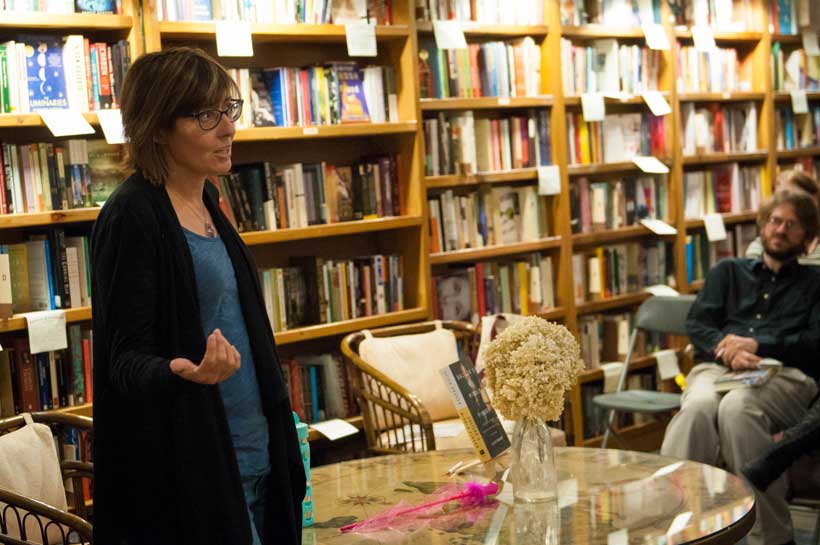Former professor calls for University to apologize for censorship
Daniel Tian/ Daily Senior Staffer
Former Feinberg Prof. Alice Dreger speaks to a group of Northwestern students and Evanston residents about her resignation in August. Dreger resigned over allegations that Feinberg censored a magazine she guest edited over a story involving a nurse performing oral sex on a recently-paralyzed man.
October 1, 2015
Former Feinberg Prof. Alice Dreger, who resigned from her position after she said the University censored a faculty magazine, is calling for an official apology from the administration.
“They need to say that a mistake was made and that they apologize and that it won’t happen again,” Dreger told The Daily.
Speaking Wednesday evening to a gathering of about 30 students and community members at Bookends & Beginnings in Evanston, Dreger explained her decision to leave Northwestern in August, just six months after publishing “Galileo’s Middle Finger: Heretics, Activists, and the Search for Justice in Science,” a book on the ethics of medical research and academic freedom based on research made possible through support from the University.
“Northwestern’s name is going to come off the jacket, and that to me is really upsetting because this book was made possible by Northwestern,” Dreger said. “It’s an incredibly bizarre, ironic story at the end of this long book of strange, strange, bizarre stories.”
Dreger said Feinberg professors were censored after Feinberg Dean Eric Neilson asked that all online issues of Atrium, a faculty-edited bioethics magazine, be removed in early 2014 over concerns about an essay that appeared in the Winter 2014 issue in which the author describes his experience of a nurse performing consensual oral sex on him after he was paralyzed at age 18. Dreger was guest editor of the issue, titled “Bad Girls.”
The Feinberg School of Medicine and the University declined to comment on Dreger’s allegations of censorship in June.
Dreger said Neilson told her the article “violates a branding agreement” between the medical school and the corporation that owns the Northwestern Memorial Hospital.
“This may be one of the first known cases of explicit reference to a brand resulting in censorship,” Dreger said. “This was already published and then withdrawn… so it really was censorship.”
Although all issues were eventually restored, the issue was only allowed to be put back online after Dreger threatened to go public, she said. Upset that the University would not admit to having censored then faculty, Dreger submitted a four-page resignation letter in August.
“You’re not supposed to censor my academic freedom,” Dreger said. “You’re supposed to defend it when people try to censor me.”
Dreger particularly criticized the corporatization of the medical school and warned against the dangers of trying to “brand” an academic institution, which she said directly contradicts the idea of free expression.
“The type of academic censorship that went down at the medical school is untenable,” Weinberg graduate student Francisco Maravilla, who attended the event, told The Daily. “It’s absolutely unacceptable, and I think that the University and the medical school in particular needs to think about how it wants to represent itself as an academic institution and not as a corporate entity.”
Maravilla and other graduate students brought genitalia-shaped cake and alcohol-infused jello to the event. Other students asked Dreger for autographs and photos.
John Wilson, an Evanston resident who helped organize the event and co-editor of The Academe Blog, which published Dreger’s letter of resignation, said the Dreger controversy should trouble students, faculty and community members alike.
“Historically, Northwestern has been one of the strongest supporters of academic freedom and really is a model for other universities,” Wilson said. “Now there’s been a series of threats to academic freedom that makes it one of the worst universities when it comes to academic freedom, and that’s been a really alarming transformation.”
Last spring, NU made headlines while investigating a Title IX complaint filed against Communication Prof. Laura Kipnis over a series of passages in an article published in the Chronicle of Higher Education. The relevant passages discussed an ongoing investigation of alleged sexual misconduct involving philosophy Prof. Peter Ludlow.
Dreger said she has yet to see the University administration make any kind of acknowledgment of the alleged censorship she said she encountered.
“They should tell (Feinberg Dean) Neilson openly that the censorship was inappropriate,” she said. “It was not in keeping with the faculty handbook’s claims of the protection of academic freedom. They should apologize. They should say it’s not gonna happen again.”
Email: [email protected]
Twitter: @kellyagonsalves


